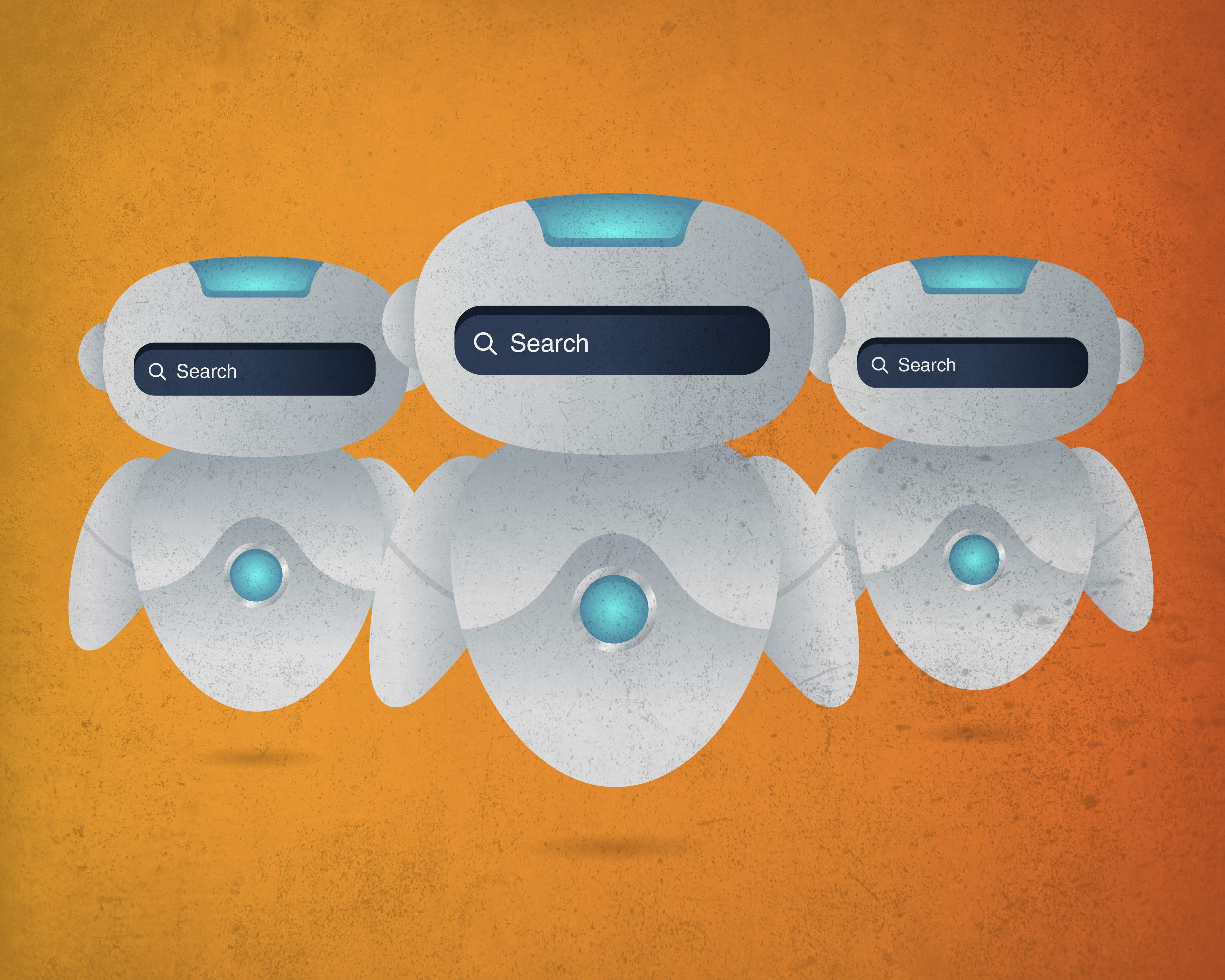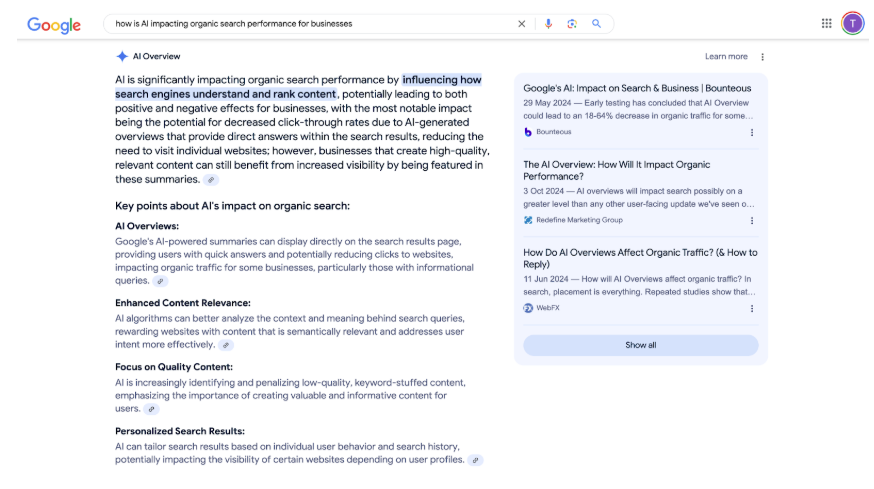Since then, my career has taken a bit of a different path and I’ve moved into client servicing and integrated marketing strategies spanning more than just digital channels. But I’ve always deep-down had a real love for SEO - she was my first love, she gave me so many opportunities and to be honest, it’s always held me in good stead at roundtables or leadership discussions as despite the simplicity of the processes followed for good SEO, many people are still scared of the technicalities and therefore I get a lot of undue credit for my limited knowledge. Even now, 10 years on.
Regardless, 2025 also marks a major, somewhat terrifying, shift for me in the SEO world. That once hopeful mentality that the industry was protected and would be needed forever more is suddenly in question. Why? … The ‘dreaded’ AI.

I say dreaded jokingly - it’s certainly not a negative in my eyes, but it has piqued my intrigue and relit a little love for SEO strategy again, because once again I’m intrigued and desperate to define strategies that will help clients navigate this new landscape. So if you’re interested, worried, concerned about organic traffic - here’s my (very basic) understanding of what’s happening right now in the organic search world, and what you can do to protect your performance.
First up, what’s changing?

The Rise of AI-Powered Search
Both Google and Bing (UK’s most used search engines) have integrated AI into their search engines to improve user experience and provide quicker, more efficient answers to search queries. For example:
Google’s Search Generative Experience (SGE):

- Uses AI to generate summaries and direct answers to queries, reducing the need for users to click through to websites.
Bing AI Chat
- Integrates OpenAI’s ChatGPT to provide more conversational and contextual search results..
And in addition to this Google’s RankBrain and Multitask Unified Model algorithms are seeing AI-driven ranking systems that will improve search understanding and optimise content discovery based on each user’s intent rather than keywords alone.
How AI is influencing search performance
On one hand, these AI advancements mean search engines are increasingly prioritising user intent and delivering richer, more interactive experiences for us as users. However, it most definitely means a shift in how we currently see and report on search performance… Here’s why.
AI tools replacing search
- AI-driven platforms like ChatGPT, Google Gemini, and Perplexity AI are rapidly evolving into standalone information hubs, reducing the need for traditional search engine queries. Instead of searching for answers on Google, users can now go directly to AI tools to get instant, conversational responses. This shift means businesses can no longer rely solely on organic search for visibility—they must explore new ways to position themselves within AI-driven ecosystems to maintain traffic and engagement.
- Examples:
- Planning an itinerary for a holiday -> Instead of searching multiple platforms / tourist locations users can now just ask ChatGPT or Perplexity to write it for them.
- Research for a project -> Instead of reading multiple articles to find out information for a project or a report, users might ask AI tools to summarise information / provide recommendations for articles to read.
- Comparison of products / brands -> Instead of Googling “best restaurants in Rome” or “best blind companies” users can ask ChatGPT or Gemini for a personalised response.
- Content Summaries -> Instead of reading long documents, students / researchers can ask an AI to summarise complex topics like “explain quantum computing in simple terms.”
- Impact: Websites that used to attract traffic via informational content might lose visitors as users prefer direct AI responses.
Zero-click searches
- Traditionally, we’d know when someone visited our webpages or engaged with our content. But one of the biggest challenges AI-powered search introduces is the rise of zero-click searches, where users find answers directly on the search results page without needing to visit a website. With Google’s AI-generated summaries and enhanced featured snippets, users are getting more direct answers than ever before—meaning fewer clicks to business websites. This is especially impactful for top-of-funnel, informational content, where organic traffic is likely to decline as AI serves users everything they need on the search page itself.
- Examples of AI powered search
- Weather -> Instead of clicking on a weather website, users see “Edinburgh weather today” directly in Google’s AI-generated answer box.
- Definitions & Quick Facts -> Searching “What is E-E-A-T in SEO?” will likely return a direct explanation from Google’s knowledge panel.
- Sports Scores & Events -> Searching “Manchester United latest score” gives real-time match updates without needing to visit a sports site.
- Impact: Websites that rely on informational queries for traffic (news sites, dictionary sites, weather platforms) might see a decline in visitors.
Visual and voice search
- AI is making search more multimodal, allowing users to search using images, voice, and even real-world interactions. Visual search tools like Google Lens allow users to find products, information, and locations just by snapping a picture—meaning traditional search strategies need to adapt to accommodate image-based discovery. Voice search, powered by AI assistants like Google Assistant, Alexa, and Siri, means searches are becoming more conversational and intent-driven. Websites that fail to optimise for natural language queries may lose visibility in this growing search segment.
- Examples:
- Visual Search:
- Shopping -> A user sees a chair in a coffee shop and takes a photo with Google Lens to find similar products online.
- Landmarks & Travel -> Instead of searching “famous buildings in Barcelona,” a tourist snaps a picture of a cathedral, and Google Lens identifies.
- Plant & Pet Identification -> A gardener takes a picture of a plant, and Google Lens tells them what it is and how to care for it.
- Voice Search:
- Finding Local Businesses -> Instead of typing “best pizza near me,” a user asks Siri or Google Assistant, “Where’s the best pizza place nearby?”
- Smart Home Commands -> Instead of searching “how to turn off Alexa alarm,” a user says, “Alexa, stop the alarm.
- Driving Directions & Quick Info -> While driving, a user asks, “What’s the traffic like on the M8?” instead of checking Google Maps manually.
- Visual Search:
- Impact: Websites that don’t optimise for conversational queries, structured data, and image search may struggle to appear in results.
So - how do you optimise your search strategy for AI in 2025?
The evolution of AI-driven search is ultimately going to change the role of websites as we know it. Historically, websites served as the primary destination for users seeking information, but with AI providing direct answers, the purpose of a website is understandably shifting.
Instead of simply being traffic generators, websites need to become trust, authority, and conversion hubs. Users may no longer need to visit your site for general information, but when they do, it’s likely with stronger intent—whether to validate expertise, engage with a brand, or complete an action.
AI-driven search is not the end of SEO or PPC strategies but it is a major shift in how people find and engage with content. The days of passively ranking on Google and waiting for traffic to roll in are fading. Now, it’s about making your brand so present, so authoritative, and so engaging that people actively seek you out—whether through search, social, PR, or even in-person interactions.
Here’s some tips on how to optimise your search strategy:
Tip 1: Make sure AI sees and serves your content
Search engines are changing how they display results, with AI summaries and zero-click answers often keeping users on Google instead of sending them to your site. To stay visible, your content needs to be AI-friendly.
- Use structured data (schema markup) so Google understands your content.
- Format content with clear, direct answers to increase the chances of being pulled into AI-driven snippets.
- Optimise for questions and intent-based queries—not just keywords.
If AI is going to summarise your expertise, make sure it credits you properly and drives traffic back to your brand.
Tip 2: Don’t abandon your SEO rules - owning your authority is more important than ever
Google is increasingly favouring content that comes from real experts with demonstrable experience and trustworthiness. This is where E-E-A-T (Experience, Expertise, Authority, Trust) comes in—a critical factor in SEO that AI-driven search is relying on even more.
What is E-E-A-T and why does it matter?
E-E-A-T stands for:
- Experience – Have you personally used or interacted with the topic you’re discussing? Google prefers content that shows first-hand knowledge rather than regurgitated information.
- Expertise – Are you a qualified expert in your field? AI and search engines look for credentials, industry recognition, and subject matter expertise.
- Authority – Is your website (or you) recognised as a trusted source? This is built through high-quality backlinks, media mentions, and collaborations with other industry leaders.
- Trust – Can people (and search engines) trust your content? This comes from transparency, accuracy, and a solid reputation—things like verified authorship, positive user reviews, and security signals on your site.
In an AI-driven world, E-E-A-T is how you stand out. If your content lacks credibility, AI-driven search results will prioritise someone else’s expertise over yours—meaning fewer clicks, less visibility, and ultimately, lost business.
Tip 3: Encourage brand engagement beyond search
AI might be answering questions for users, but it’s not building relationships. That’s where you win. The brands that survive AI-driven search changes are the ones that create memorable, multi-touchpoint engagement.
- Field marketing and brand ambassadors – Give people a reason to talk about you offline. Sponsor events, get your product into hands, and create brand moments people won’t forget. This also can double-up as a strategy to gather brand noise and earn media coverage / links back to your site.
- PR and thought leadership – Get quoted in articles, do guest appearances, host webinars. If people hear about you outside of search, they’ll Google you directly.
- Social-first content – AI can’t replace human connection. Double down on video, behind-the-scenes content, and community engagement. Platforms like TikTok, LinkedIn, and Instagram are where people discover brands naturally.
- Email and direct relationships – Own your audience. AI isn’t going to help you build a list of dedicated customers—email marketing will.
Search used to be the main driver of brand discovery. That’s no longer the case. Now, it’s about making your brand so strong, so talked about, and so visible across multiple touchpoints that people find you naturally. Think of ways to build branded search.
Tip 4: PPC will get more expensive—so how do we counteract it?
As AI-driven search takes up more real estate in results, organic click-through rates are going to drop, and PPC competition will increase. More brands will be forced to rely on ads, which means higher costs per click (CPC) and more aggressive bidding strategies.
So, what’s the move?
- Get smarter with audience targeting – AI-driven search will reduce general organic visibility, but PPC allows for hyper-targeted ads. Lean into first-party data, retargeting, and customer match lists.
- Optimise ad copy for AI-powered search – Instead of just bidding on keywords, test conversational ad formats that match AI-driven queries.
- Use AI to fight AI – Leverage Google’s Performance Max and AI-driven bidding to maximise efficiency.
- Diversify your ad spend – Don’t just pump money into Google Ads—explore TikTok Ads, LinkedIn Ads, and native advertising to capture attention where search can’t.
The brands that only rely on SEO and PPC for traffic are going to feel the squeeze. The ones that diversify their approach will thrive.
Tip 5: Re-evaluating reporting & success metrics in 2025
The traditional success metrics for SEO and digital marketing need reassessment. Organic traffic, once the gold standard of performance, may no longer reflect true business success as more searches result in AI-provided answers without clicks.
Key metrics to consider:
- Brand searches – How often are users searching for your brand directly? This indicates strong brand presence and recall.
- Engagement metrics – Are users who land on your site staying, interacting, and returning? Time on site, pages per visit, and repeat traffic signal deeper connections.
- Conversion-based goals – Measuring form fills, sales, sign-ups, or any actions that contribute to business growth rather than just tracking clicks.
- Referral & direct traffic – With AI-driven search reducing click-throughs, traffic from social media, email campaigns, and direct visits becomes more valuable.
- AI mentions & citations – Are AI tools referencing your brand or content? Being positioned within AI-driven search results or tools like ChatGPT can build credibility even if it doesn’t drive immediate traffic.
Success in 2025 isn’t just about ranking—it’s about ensuring your brand remains relevant, visible, and authoritative in an AI-driven landscape. Businesses should focus on building an ecosystem where search is just one of multiple discovery and engagement channels.
Tip 6: Test, tweak, and adapt—because this isn’t slowing down
AI-driven search is still evolving, and nobody has the perfect formula yet. But one thing is clear: SEO is no longer just about search rankings—it’s about visibility, authority, and brand strength across multiple channels.
So, keep experimenting.
- Monitor how AI-driven search results impact your traffic.
- Stay ahead of Google’s changes (because they’re not done tweaking things yet).
- Be ready to pivot—what works today might not work in six months.
AI isn’t killing SEO—it’s forcing it to evolve. The brands that embrace that shift and build stronger, more engaging presences across multiple channels will win.
Final Thought: Be the brand people search for—not just a brand that ranks
If your only strategy is to rank on Google, you’re vulnerable. But if people know your name, follow your content, and engage with your brand on multiple channels, AI-driven search can’t take that away from you. That’s the real goal.
For any questions, or if you want to know more about AI and SEO, email us at info@union.co.uk



